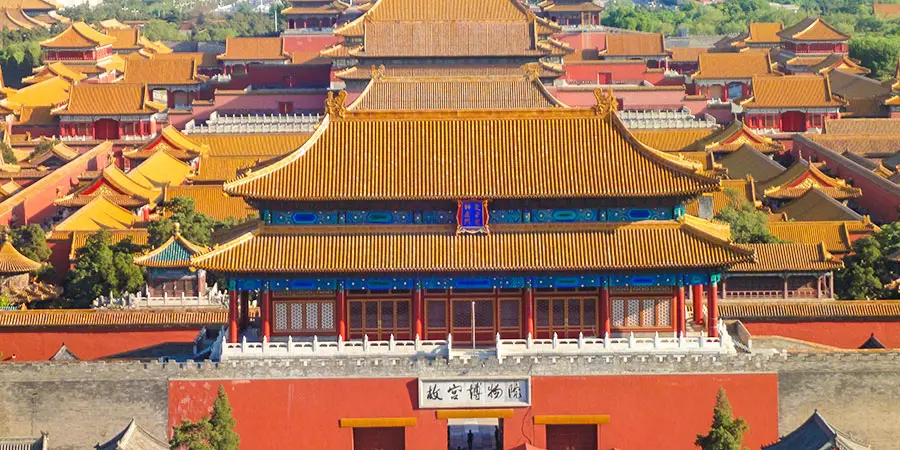Feng Shui and Architecture
Architectural Feng Shui is the soul of China’s ancient architectural theories. It enjoys a high status in China’s architecture history.
One of the important Feng Shui principles used in architecture is ‘leaning against mountains and facing waters’. This has been widely used at either a large or small scale. Take Xi'an, the well-known ancient capital city, for example; one of the important reasons it was chosen by 13 dynasties as their capital was because the site was surrounded by nine mountains (Mt. Zhongnan, Mt. Cuihua, Mt. Lishan, Mt. Guanshan, Mt. Yuhua, Mt. Liangshan, Mt. Qishan, Mt. Tianhua and Mt. Taibai) and girdled by eight rivers (Weihe River, Jinghe River, Fenghe River, Laohe River, Jiaohe River, Haohe River, Chanhe River and Bahe River). This was considered quite auspicious by masters. Another good example is the famous courtyard in Beijing, which is surrounded by rooms in all directions.
One of the important Feng Shui principles used in architecture is ‘leaning against mountains and facing waters’. This has been widely used at either a large or small scale. Take Xi'an, the well-known ancient capital city, for example; one of the important reasons it was chosen by 13 dynasties as their capital was because the site was surrounded by nine mountains (Mt. Zhongnan, Mt. Cuihua, Mt. Lishan, Mt. Guanshan, Mt. Yuhua, Mt. Liangshan, Mt. Qishan, Mt. Tianhua and Mt. Taibai) and girdled by eight rivers (Weihe River, Jinghe River, Fenghe River, Laohe River, Jiaohe River, Haohe River, Chanhe River and Bahe River). This was considered quite auspicious by masters. Another good example is the famous courtyard in Beijing, which is surrounded by rooms in all directions.
 |
| A bird's eye view of Forbidden City |
FengShui stresses symmetry in architecture. Many ancient Chinese constructions, including cities, palaces, residences, and tombs, are bilaterally symmetrical. The Forbidden City, the world’s best-preserved imperial palace was built in a bilaterally symmetrical way. At its core was an axis line, which traveled through the palace in a south-north direction. Most construction inside the palace was symmetrically arranged on either side of the axis; other structures, including the three biggest outer court palaces - Hall of Supreme Harmony, Hall of Central Harmony, and Hall of Preserved Harmony and three inner court palaces - Palace of Heavenly Purity, Palace of Earthly Tranquility and Hall of Celestial and Terrestrial Union, were bisected by the axis, as were the thrones inside these palaces. Even two of the most important architectural complexes of the ancient Beijing city – Temple of Heaven and Altar of Agriculture, although outside the palace, were arranged symmetrically on either side of the axis.
Curves are also preferred during construction activities for it symbols vitality in FengShui. In China, many bridges are built with arches; corridors are winding, man-made rivers are sinuous. Inside the mausoleum complex of Qing Dynasty (1644 - 1911 AD) emperors, small structures were often seen in front of large structures; south-north buildings were built in front of or behind the east-west buildings. Hence, certain kinds of curves were formed.
It is auspicious to plant trees around buildings. In ancient times, villagers planted large stretches of FengShui woods outside the village. They thought those woods could protect them and were closely related to the rise and fall of the village’s prosperity. Nowadays, the mysterious FengShui woods can still be found outside some villages. However, there are taboos of planting trees: do not plant mulberry trees in front of the residence and willows behind; it is not good to plant poplars in the yard; big trees are better to be avoided in the yard too. These block not only sunshine, but also airflow; they are not recommended in front of the front gate either.
In real life, it is difficult to select a site or construct a building with perfect FengShui. Then, the principle of modifying FengShui is applied. The above mentioned planting of trees around buildings is a method of modifying the FengShui. Other modification practices applied to architecture include digging wells if there is not enough water, digging canals if water flow is blocked.
 Further Reading: Feng Shui Tips for Home, Graveyard Feng Shui, China Cities with Good Feng Shui
Further Reading: Feng Shui Tips for Home, Graveyard Feng Shui, China Cities with Good Feng Shui
Curves are also preferred during construction activities for it symbols vitality in FengShui. In China, many bridges are built with arches; corridors are winding, man-made rivers are sinuous. Inside the mausoleum complex of Qing Dynasty (1644 - 1911 AD) emperors, small structures were often seen in front of large structures; south-north buildings were built in front of or behind the east-west buildings. Hence, certain kinds of curves were formed.
It is auspicious to plant trees around buildings. In ancient times, villagers planted large stretches of FengShui woods outside the village. They thought those woods could protect them and were closely related to the rise and fall of the village’s prosperity. Nowadays, the mysterious FengShui woods can still be found outside some villages. However, there are taboos of planting trees: do not plant mulberry trees in front of the residence and willows behind; it is not good to plant poplars in the yard; big trees are better to be avoided in the yard too. These block not only sunshine, but also airflow; they are not recommended in front of the front gate either.
In real life, it is difficult to select a site or construct a building with perfect FengShui. Then, the principle of modifying FengShui is applied. The above mentioned planting of trees around buildings is a method of modifying the FengShui. Other modification practices applied to architecture include digging wells if there is not enough water, digging canals if water flow is blocked.
- Last updated on Aug. 07, 2025 by Gabby Li -